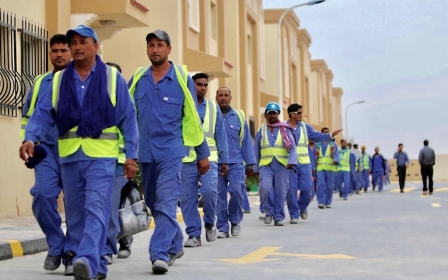Qatar should 'amend, change or withdraw' laws that impede free speech: EU
Qatar has been told to scrap several laws that impede freedom of speech and expression after the gas-rich nation recently enacted a "vaguely worded" law that criminalises the publication of "false" news with up to five years in prison.
Speaking in the Qatari capital on Monday, Eamon Gilmore, the European Union's special representative for human rights, said he was "concerned about some pieces of legislation which relate to freedom of expression and freedom of the press".
Gilmore, who was attending an event in Doha promoting the online rights of activists, raised specific concerns over a cybercrime prevention law passed in 2014 which carries a three-year sentence to anyone convicted of creating a digital platform for "fake news".
'Freedom of expression is a very important part of the way in which the European Union sees human rights'
- Eamon Gilmore, EU special representative for human rights
The penalty was recently increased to five years in cases where "ill intent" could be proved.
However, no definition of what constitutes "fake news" was given in the act.
New MEE newsletter: Jerusalem Dispatch
Sign up to get the latest insights and analysis on Israel-Palestine, alongside Turkey Unpacked and other MEE newsletters
"We urge that those laws be amended, changed or withdrawn," Gilmore said.
The laws were also flagged as problematic during Qatar's most recent Universal Periodic Review, the scrutiny process which all 193 UN countries must undergo approximately every four years, he added.
Gilmore said he raised the concerns with the foreign affairs ministry and the National Human Rights Committee which is staging the two-day conference.
"Freedom of expression is a very important part of the way in which the European Union sees human rights. We attach a very high priority to it," he said.
Independent UN experts have previously warned that Qatar's strict "lese majeste" laws, which prohibit disrespect of the ruler or other officials and carry custodial sentences, could amount to arbitrary detention because they violate free speech rights.
Mashrou' Leila
Earlier this month, Qatar was criticised after a talk to be given by Mashrou' Leila - a popular pro-LGBTQ Lebanese band - at Northwestern University's campus in Doha was cancelled.
Northwestern University released a statement stating that both the band and the university "mutually agreed" to change the venue to the university's campus in the US state of Illinois over safety concerns.
However, the university's local partner, Qatar Foundation (QF), challenged Northwestern's allegations, with a spokesman implying that the event was axed because it did not comply with Qatari laws and culture.
"We place the utmost importance on the safety of our community and currently do not have any safety or security concerns," a QF spokesman told Reuters.
Rights groups have repeatedly criticised Qatari authorities for encouraging self-censorship among publishers as the tiny Gulf nation prepares to host the 2022 World Cup.
On Saturday, Human Rights Watch issued a stinging rebuke of Qatar, saying efforts to ensure the payment of workers' salaries were falling "short" of international standards.
Middle East Eye delivers independent and unrivalled coverage and analysis of the Middle East, North Africa and beyond. To learn more about republishing this content and the associated fees, please fill out this form. More about MEE can be found here.





